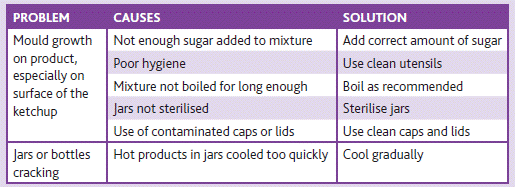Tomatoes are grown all over the world. During the harvest, most farmers sell them at very low prices, because they spoil very quickly. Many tomatoes also go to waste because they cannot be sold in time.
To avoid this, farmers can process tomatoes into various products for storage and use at home or as value-added products for income generation.
Tomatoes are rich in:
- vitamins and minerals, which are important for health
- lycopene (the substance that makes tomatoes red), which has cancer-preventing properties.
Making tomato pulp
Step 1: Choosing the tomatoesSelect tomatoes that are ripe, red, have a firm texture and are free of disease and mould.
Step 2: Washing
Wash the freshly harvested tomatoes in clean water in a large bucket.
Step 3: Boiling
Place the tomatoes in a cooking pot. Cover with water and boil until they are soft and the skin peels off easily – but do not peel them.
Step 4: Pulping
- Remove the tomatoes from the pot using a large spoon with holes and place them in another container.
- Mash using a large wooden spoon.
- Use a large household sieve to separate the tomato pulp from the seeds and skin.
- Discard the seeds and skin or feed them to your chickens and keep the pulp.
Tomato ketchup recipe
- 1 kilogram tomato pulp
- 150 grams sugar
- 45 grams of onions, finely chopped (one small onion)
- Spices (mace, cinnamon, cumin, cardamom, ground black pepper, ground white pepper, ground ginger) – add according to taste and availability. Chilli powder can be added to make a tomato chilli sauce.
- Salt (add according to taste)
- 80g vinegar
- Add 50g sugar to 1 kg of tomato pulp, with the onions and the spices tied loosely in a muslin bag.
- Heat slowly to below boiling point to dissolve the sugar, keep stirring to prevent burning. Continue heating until the volume of the mixture has reduced by half.
- Remove the spice bag.
- Add the remaining 100g sugar, the salt and the vinegar. Continue stirring and heating for 5 to 10 minutes. Check that the sugar and salt have completely dissolved and that sauce has reached a thick consistency. Remove the sauce from the heat.
- Cool to 80°C and pour the hot ketchup into sterilised bottles or jars. Close the lids tightly.
- Cool to room temperature.
- Store away from sunlight in a cool place. Ketchup can be stored at room temperature for six months if not opened.
What could go wrong?

This article has been produced with the kind permission of CTA Publishing from their original CTA Practical Guide, No.12. More information on their guides is available on the Resources page.










